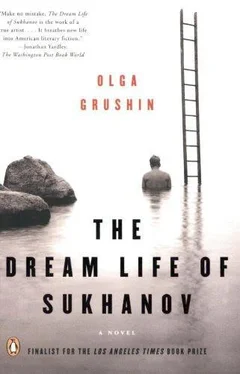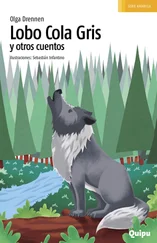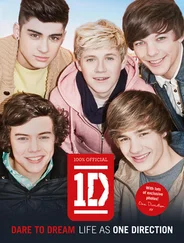He took her head in his hands, and she fell silent, peering at him, shyly or fearfully perhaps, out of her slightly crossed eyes.
“You are a real Russian woman, Valentina Aleksandrovna,” he said earnestly. “Please forgive me.”
Then he drew her toward him, kissed her on the forehead, and walked away, feeling her eyes following him closely through the basement gloom all the way to the stairs. The last expression on her face had been strangely akin to pity, and he pondered it briefly, then dismissed it. Back in the lobby, he stopped by the concierge’s desk, to inform him that the eighth floor had vanished. Then he had an afterthought.
“I also need to borrow this, it belongs to my dream anyway,” he said, and leaning over the strangely still concierge, opened a drawer in the desk and pulled out the tattered, formerly checkered scarf. “It might be cold where I’m going,” he explained amiably, and wondering why he had never before noticed how much like a wooden marionette the old man looked, strolled outside, singing his favorite Tchaikovsky aria under his breath.
The taxi was still there, waiting at the curb. Sukhanov bent to the window.
“I don’t have any money,” he said, “and I need to go some distance.”
“Don’t worry, I’ll take you for free,” said the invisible driver, his yellow beard fluttering in the shadows. “I know where you want to go, I’ve been there before. Hop in.”
The car moved off again, but this time, the journey took much longer. There were streets and lights at first, then ugly clusters of apartment buildings amid the emptiness of deserted lots with weeds swaying in the breeze, then black cutouts of trees against the sky, then endless fields, then nothing. After another hour they arrived. The air was crisp, the church silhouetted clearly against the light blue of the waning night.
“Stop here,” Sukhanov said, smiling, from the backseat. “This is Bogoliubovka.”
He could tell that in the darkness ahead of him the invisible man with the canary-yellow beard was smiling too. Sukhanov stepped outside; the earth smelled of daffodils and sleep.
“Be happy,” said the driver, leaning forward and waving. For one instant, as the man’s face passed through the ray of a solitary streetlamp, Sukhanov saw the familiar features of the apothecary from DalÍ’s canvases; in the next moment, the painted man and the car with its lights melted away. “It makes sense,” he whispered joyously. “It’s all connected.”
In his excitement he ran up the hill. The church was as he remembered it, with its stale odors and pale processions of saints treading around the corners and crows cawing hoarsely in their dreams and the sky falling through the broken dome in sharp, jagged, brilliant fragments. He felt complete and at peace, as if he had never left here. The man he had seen earlier was gone, but on the threshold he stumbled against something bulky and was pleasantly surprised to discover his bag, stolen at the ghostly station who knew how long ago, he recalled, by another of Dalí’s doubles. Someone had already pulled out his favorite gray coat; it lay spread on the floor a few steps away. Unconcerned, he picked it up, shook the dust off, and wrapped himself in it, for winter was drawing near, and then carefully walked through the broken glass and crunching plaster, surveying his new canvas.
It was perfect, absolutely perfect, just as he knew it would be. Here, then, on these ancient walls, he would deposit the riches of his life—here he would paint his own angels and saints and gods, and perhaps a self-portrait or two—here he would live, eternally free, triumphantly unencumbered by the muddle of tedious obligations, the shame of daily compromises, the chaos of ordinary life….
Pausing in the doorway, he looked out into the night, silent, tranquil, undisturbed by human presence; only far, far below him, two or three scattered lights trembled in the invisible village. And then, as he stood watching their uncertain blinking in the darkness at his feet, somewhere in the hidden recesses of his soul a door recently closed seemed to swing open; and for a moment, for a single moment, a torrent of memories burst out of confinement. These were not the memories of his tragic, thwarted childhood or his brilliant, daring youth; these were the neglected memories of other, later times, uninspired, unremarkable, common—memories of bending with his wife over a cradle, studying, with a mixture of pride and alarm, the tiny red face of a newborn laboring over a cry; memories of strolling through a sun-sprinkled city park, laughing as his one-year-old son wobbled on unsteady legs from tree trunk to tree trunk; memories of reading a fairy tale late into the night to his six-year-old daughter, who lay in bed sick with the flu, her eyes feverishly bright, refusing to fall asleep until he turned the last page; memories of the four of them gathered in the evening around a fire on a deserted beach, listening to the breathing of the sea and the hissing of mussels in the flames…. And for one moment, while the door in his soul stayed open, these recollections pierced him with an unsustainable sorrow—and already in some deeper, dimmer layer of his being an ugly, unbearable suspicion was beginning to stir, and he almost wondered whether he had misunderstood everything after all—whether his newfound purpose was truly the dazzling revelation he had imagined it to be, or merely a… a…
And then the moment joined all the others on their way to oblivion. Exhaling, he slammed the door shut, this time forever, just as the last lights in the village below wavered and went out as if quickly covered by a giant hand. Everything was perfect, absolutely perfect, he told himself again. His path stretched clear before him, and he was not alone, he would never be alone—the whole world would be with him, helping him, watching over him, lending him branches for brushes, warm earth for pigments, and now and then, a falling star or two for inspiration.
He stepped outside, scooped up a handful of soil, crumbled it between his fingers, and smelled it, laughing softly. Then, once the echo of his laughter had faded, he began to mix the glorious rainbow of his new palette.
I am immensely grateful to my wonderful agent, Warren Frazier, and my incomparable editor Marian Wood—without them none of this would have happened. Thanks also to my remarkable UK editor, Mary Mount; my copy editor, Anna Jardine, who is as tireless as she is skilled; and everyone at the Penguin Group who believed in this book. Finally, thanks are due to my parents, Boris Grushin and Natalia Kartseva, for their love and support and for serving as a priceless source on Sukhanov’s Russia, and to my husband, Michael Klyce, who helped in more ways than I can name.
Critics’ praise for The Dream Life of Sukhanov and Olga Grushin
“English is Grushin’s third language. Yet so accomplished are her skills—so hauntingly assured—that more than one U.S. critic has greeted her as the next great American novelist…. To write a novel as good as this you need to be very talented. And Grushin is.”
—
Financial Times
“This magnificent novel celebrates surrealistic painting by being surrealistic itself and makes the moral point that artistic integrity, at any cost, is ultimately more rewarding than compromised celebrity. In the context of Soviet Russia, where insistence on the right to freedom of artistic expression could have fatal consequences, this theme is particularly dramatic. But freedom of expression is constantly threatened everywhere, by all kinds of forces, some overt and some subtle, so this specifically Russian story has universal resonance…. Grushin is a Russian writing in English—such astonishingly beautiful English that it is almost impossible to believe it is not her first language…. This is an outstanding novel. It’s a first one, too [and] with it, Grushin raises the bar for first novels. Like all excellent works… it fills one with joy, because it works on every level.”
Читать дальше








![Theresa Cheung - The Dream Dictionary from A to Z [Revised edition] - The Ultimate A–Z to Interpret the Secrets of Your Dreams](/books/692092/theresa-cheung-the-dream-dictionary-from-a-to-z-r-thumb.webp)



